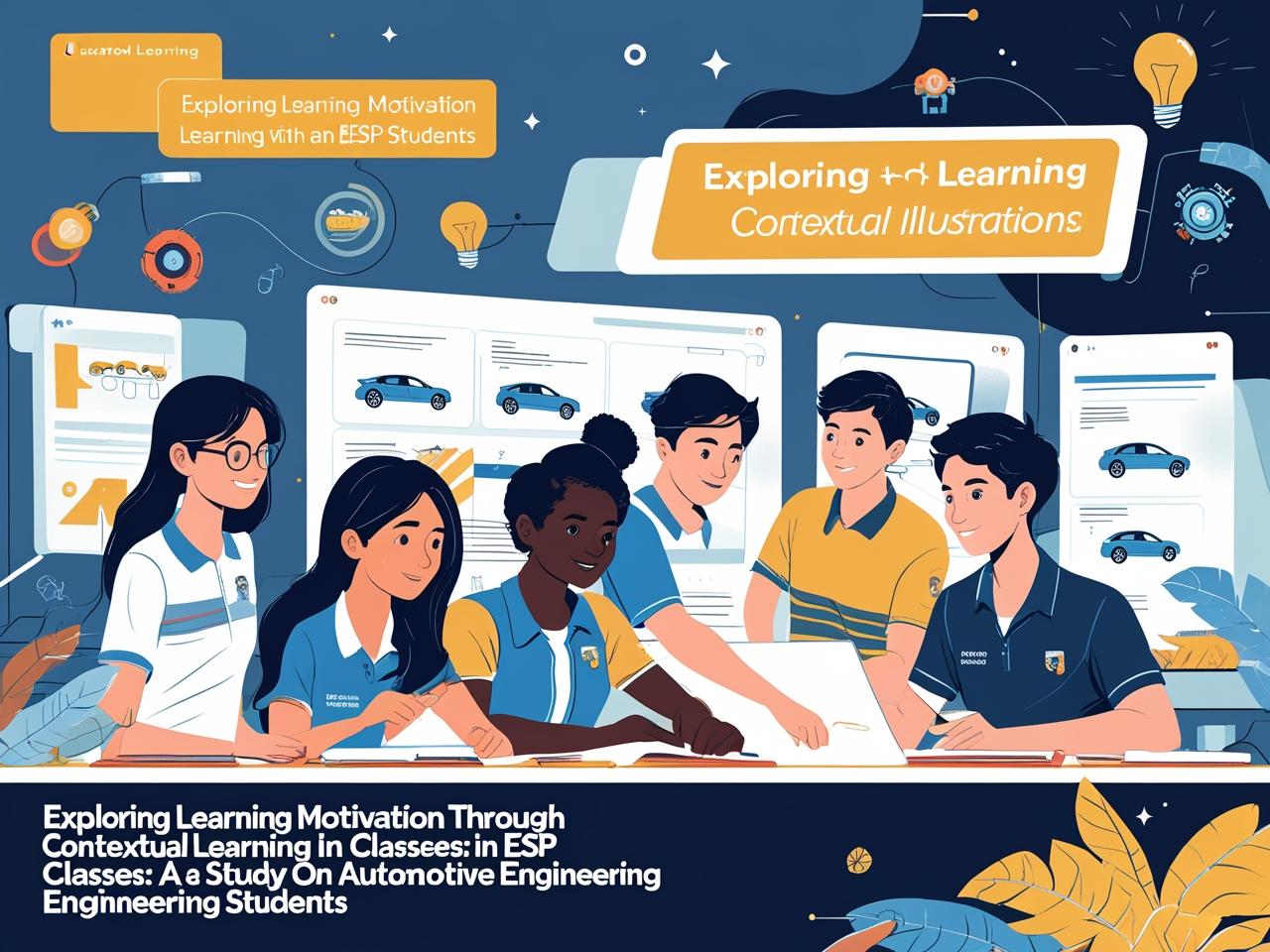Exploring Learning Motivation Through Contextual Learning in ESP Classes: A Study on Automotive Engineering Students
DOI:
https://doi.org/10.24903/bej.v7i2.2097Keywords:
ARCS Model, Automotive Engineering, Contextual Learning, English for Specific Purposes (ESP), Learning MotivationAbstract
This research investigated how contextual learning influences students’ motivation and English proficiency in English for Specific Purposes (ESP) classes for automotive engineering students. Motivated by the disconnect between general English curricula and students’ vocational goals, this research applies contextual strategies aligned with the ARCS motivational model—Attention, Relevance, Confidence, and Satisfaction. A total of 91 students participated, and data were collected using a validated questionnaire. Statistical analyses, including Cronbach’s alpha (0.851), descriptive statistics, t-tests, and multiple regression, were used. The findings reveal that contextual learning significantly enhances students’ motivation, especially in the areas of relevance and attention, and contributes positively to their English language performance. Regression analysis showed that motivational factors explained 18.1% of the variance in English proficiency scores, with “Relevance” emerging as the strongest predictor. Students reported higher satisfaction and engagement when learning materials reflected their professional context. This research confirms that integrating real-world content into ESP instruction not only improves student motivation but also supports linguistic outcomes. These results advocate for ESP curricula that are closely tied to industry-related content to better equip vocational students for future professional demands.References
Ayu, P., Usadiati, W., & Karani, E. (2021). An Approach of English Teaching for Automotive and Vehicle Engineering Students. An Approach of English Teaching for Automotive and Vehicle Engineering Students Intensive Journal, 4(2), 2021. http://ojs.uniska-bjm.ac.id/index.php/EJB
Bazhutina, M. M., & Tsepilova, A. V. (2024). The Development of Cefr-Based Descriptors for Assessing Engineering Students’ Integrative ESP Competence. ESP Today, 12(1), 93–117. https://doi.org/10.18485/esptoday.2024.12.1.5
Belcher, D. (2009). English for specific purposes in theory and practice (D. Belcher, Ed.). University of Michigan Press.
Brett D. Jones, M. C. P. S. F. H. T. W. K. (2013). An Analysis of Motivation Constructs with First-Year Engineering Students: Relationships Among Expectancies, Values, Achievement, and Career Plans.
Brown, T. , & W. E. (2022). Contextual learning and student engagement in ESP. Journal of Language and Vocational Education.
Creswell, J. W. (2009). Research Design: Qualitative, Quantitative, and Mixed Methods Approaches (3rd ed.). SAGE Publication. https://www.ucg.ac.me/skladiste/blog_609332/objava_105202/fajlovi/Creswell.pdf
Dayan Liu, P. Z. (2010). Developing Courses in English for Specific Purposes.
Fadlia, F., Zulida, E., Asra, S., Rahmiati, R., & Bania, A. S. (2020). English Subject on English for Specific Purposes (ESP) In Vocational Schools. Language Literacy: Journal of Linguistics, Literature, and Language Teaching, 4(2), 358–367. https://doi.org/10.30743/ll.v4i2.3064
Humeniuk, I. , R. A. , M. O. , et al. (2024). (2024). Case study at ESP classes as mode of language adaptation to future engineering profession.
Hutchinson, T. , & W. A. (2021). English for Specific Purposes: A learning-centered approach.
Innovations and Challenges in Language Learning Motivation. (n.d.). www.routledge.com/
Kamaruddin, A., Fitria, N., & Patmasari, A. (2021). Needs analysis-based ESP course design for vocational high school students. KEMBARA Journal of Scientific Language Literature and Teaching, 7(2), 222–231. https://doi.org/10.22219/kembara.v7i2.17591
Manuel Rodríguez-Peñarroja. (2022). Integrating Project-Based Learning, Task-Based Language Teaching Approach and Youtube In The ESP Class: A Study on Students’ Motivation.
Martinez, R. , & C. L. (2023). Project-based learning in automotive ESP courses. ESP Journal, 14(1), 33-50.
Ningsih, N., Rahman, P., & Nelson, S. S. (2024). Tailored Linguistic Instruction for ESP: Strategies and Applications in the Global Arena. In International Journal in Applied Linguistics of Parahikma (Vol. 7, Issue 1). https://journal.parahikma.ac.id/ijalparahikma/article/view/464
Nur Fitria, T. (2023). Teaching English for Specific Purposes (ESP): Teachers’ Role and Their Challenges.
Nurcahyani, B., Sadapotto, A., Hermansyah, S., Kasman, N., & Ahmad, J. (2024). Global Journal of Arts Humanity and Social Sciences Designing English for Automotive Students in Vocational High School Article History. https://doi.org/10.5281/zenodo.14438411
Nurhasanah, I., Makrifah, I. A., & Mubarok, T. A. (2024). Developing English Book for X TKR of Vocational High School Based on Contextual Purposes. https://doi.org/10.25217/jed.v3i01.3644
Rahayu, S., Sutarni, N., Nofriansyah, N., & Soffiatun, S. (2025). The Effectiveness of the Arcs Learning Model in Improving Student Learning Outcomes in Economics. Research and Development Journal of Education, 11(1), 115–123. https://doi.org/10.30998/rdje.v11i1.27273
Ronaldo, O., Wulaning, R., & Saleh, P. (2020). The Needs for English Learning Material in Mechanical Engineering Department at Institute Technology of Padang Kebutuhan Materi Pembelajaran Bahasa Inggris pada Jurusan Teknik Mesin di Institut Teknologi Padang. In Journal of Asian Studies: Culture, Language, Art and Communications Published By. Haqi Publishing Service Journal Homepage Journal of Asian Studies: Culture, Language, Art and Communications (Vol. 1, Issue 1).
Shaidullina, A. R., Krylov, D. A., Sadoveanu, V. V., Yunusova, G. R., Glebov, S. O., Masalimova, A. R., & Korshunova, I. V. (2015). Model of vocational school, high school and manufacture integration in the regional system of professional education. Review of European Studies, 7(1), 63–67. https://doi.org/10.5539/res.v7n1p63
Smith, J. , & L. K. (2023). Motivation challenges in ESP for vocational learners.
Wijayanti, F. I., & Nugroho, A. (2021). English Material Needs of Automotive Technology Students: An ESP Approach. ETERNAL (English, Teaching, Learning, and Research Journal), 7.
Xueli, W., Muslim Md, Z. M., & Peipei, T. (2025). The Effect of the Arcs Model of Motivation on Students’ Learning Achievement: A Meta-Analysis. Journal of Lifestyle and SDG’S Review, 5(2). https://doi.org/10.47172/2965-730X.SDGsReview.v5.n02.pe03220

Downloads
Published
How to Cite
Issue
Section
License
Copyright (c) 2025 Yeni Rahmawati, Adit Septianto, Khusnul Khatimah

This work is licensed under a Creative Commons Attribution 4.0 International License.
Authors retain copyright and grant the journal right of first publication with the work simultaneously licensed under a Creative Commons Attribution 4.0 International License that allows others to share the work with an acknowledgment of the work's authorship and initial publication in this journal.



